In scientific literature, the term “microbiome” has been around since the 1920s, but it wasn’t until the last couple of decades that experts began to understand how our intestinal microbes may affect the rest of our overall health. (1, 2) In fact, it’s become increasingly clear that the balance of our gut bacteria can impact us more than we think, from our mental health to chronic disease risk, digestive wellness, and more. (3, 4, 5)
Thus, probiotic supplements like Yourbiology Gut+ have been developed to address specific health concerns. This supplement differs from others in that it features 10 probiotic strains specifically targeted at women’s health issues, from brighter skin to improved energy levels, and, of course, improved digestion. It stands out not only for its numerous bacterial strains but also for its inclusion of digestive enzymes, fiber, and vitamin D.
As a nutritionist, I’ve not only done extensive research on probiotics, I take them myself daily. And as a woman, I know that issues like constipation and bloating are more likely to affect us ladies. (6) Below, I look at the pros and cons of this probiotic supplement brand, and hope to help you determine if it’s one you should include in your supplement regimen.
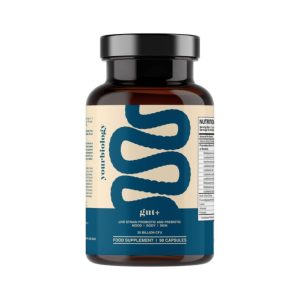

Key product features
What you should know
Yourbiology Gut+ is relatively pricey but may address multiple health concerns since it provides 10 different probiotic strains aimed at improving women’s health.
- If you don’t notice an improvement in your health within two months, Yourbiology offers a risk-free money-back guarantee.
- Pricing on these probiotics starts at $1.30 per day and goes up from there, depending on how many bottles you purchase. This is on the higher side for probiotic supplements, many of which cost under $0.50 per serving.
- Yourbiology Gut+ may benefit women looking for better digestion, better moods, easier weight loss, and more energy. Bifidobacterium breve, for example, may support fat loss in pre-obese people, while Lactobacillus acidophilus may reduce diarrhea induced by antibiotics. (7, 8)
Yourbiology probiotics overview
Yourbiology Gut+ probiotics may appeal to a wide range of women. With 10 probiotic strains, these capsules may support different health conditions. Bifidobacterium breve, for example, has been linked with helping pre-obese individuals lose body fat, while Lactobacillus acidophilus may reduce antibiotic-associated diarrhea, reduce vaginal inflammation, and help treat and prevent yeast infections. (7,8)
The brand provides evidence of other health benefits (like stress reduction, heightened immunity, and clearer skin) with ample additional research studies. A 2014 study, for example, is given as evidence of the strain Lactobacillus casei’s ability to reduce inflammation, and another study supports the notion that Lactobacillus paracasei may benefit skin conditions like atopic dermatitis. (9, 10)
Meanwhile, each of the 10 strains has at least 1 billion microorganisms—well exceeding the recommended 1 billion CFU minimum in probiotics. (11)
The fact that Yourbiology doesn’t require refrigeration is another plus. As a shelf-stable supplement, it can be stored in a cool, dry place. The brand even invites users to test for live bacteria by combining an opened capsule with whole milk. According to the Yourbiology website, if the milk curdles, it means the bacteria are living and active. However, some experts say this test is unreliable. (12) One of the best ways to see if a probiotic works is by consuming it consistently over a few weeks and noticing any differences in your GI.
In addition to beneficial gut microbes, Yourbiology Gut+ has some other noteworthy extras. Prebiotic fiber and digestive enzymes are both included to optimize smooth digestion. Per serving, you’ll get 45 milligrams of a fiber called inulin. Research has linked inulin with numerous health benefits like lower blood sugar, weight loss, and reduced colon cancer risk. (13) That said, 45 milligrams is not a high amount, and it’s generally recommended to start with an inulin dose of 5 grams. Meanwhile, the digestive enzymes protease, lipase, and amylase, all included, can help the GI tract break down food, promoting better digestion. (14)
Each serving also supplies 50% of the daily value (DV) of vitamin D. Even in low-risk women (aka those with darker skin or minimal exposed skin), vitamin D deficiency is common—so, for many, it may be a good idea to supplement. (15)
Compared to other probiotics on the market, Yourbiology Gut+ is on the pricier side. When you purchase a five-bottle package (the best deal), you’ll pay $1.30 per serving. However, if you go with a one-month supply, you’ll pay $2.17 per serving. At the time of this writing, due to limited inventory, the brand has a five bottle-per-household limit. On the plus side, though, all orders come with free shipping and a money-back guarantee if you’re not satisfied with results after two months.
One major drawback of Yourbiology’s probiotics is their lack of third-party testing. Although the brand states that its supplements are made in a GMP-certified facility, meaning it has verified good manufacturing practices, it doesn’t offer assurance that the probiotics have been tested by an outside agency. Third-party testing verifies that supplements have been vetted for purity and quality. Not having this outside confirmation is a red flag that products may not contain what they claim.
What customers are saying
Yourbiology Gut+ doesn’t have a strong presence in online third-party reviews, with only four reviews on Trustpilot. Of these, it gets an average of 3.3 stars out of 5. Reviewer Mary Jimenez writes that the supplements have been extremely helpful for digestive health.
Build callout: “I have IBS and many problems come with it. I’ve tried everything. This probiotic has helped me a lot to regulate and stop the pain.” Mary Jimenez, Trustpilot
The couple of negative reviews on Trustpilot both mention the brand’s poor customer service. “There was no transparency regarding the total cost of the order (which ended up being substantially more than documented at the time of purchase). Customer service never replied to any questions or requests for more information,” writes reviewer Rylee Lewis.
We’ve featured Yourbiology in:
Who Yourbiology probiotics are recommended for:
Women who struggle with digestive issues like constipation, gas, and bloating are the primary target audience for Yourbiology Gut+. But even if you’re not affected by GI issues, you might still consider the supplement. Yourbiology cites research supporting the use of the strains included in its formula for skin health, mood, stress, immunity, energy, and focus—so it may be worth a try if you’re looking for improvements in any of these areas of health.
Related: The best probiotic supplements for women
Who Yourbiology probiotics is not recommended for:
According to the Yourbiology supplement facts label, the product isn’t suitable for pregnant or breastfeeding women. Yourbiology Gut+ also isn’t intended for men (though it’s not clear what adverse effects, if any, men might experience from taking it). And just because you’re female doesn’t necessarily mean you need a probiotic. These supplements are primarily recommended for people with gastrointestinal health concerns. (16)
People with compromised immune systems or underlying health conditions should always speak with their healthcare provider before selecting a probiotic, as introducing new bacteria into the gut could be harmful. (17)
Finally, don’t give probiotics to infants. According to the National Center for Complementary and Integrative Health, there have been cases of severe and even fatal infections from administering probiotics to children in this age group, especially those born prematurely. (18)
Expert opinion
We consulted with Victoria Burgess, Ph.D., CSCS, CISSN, a certified sports nutritionist, for her take on this probiotic supplement.
“This product is a solid all around probiotic that includes 10 different strains to help tackle all different areas the gut may need support with. Although the amounts on specific strains aren’t mentioned, there is over 1 billion CFUs total in each, which can pretty much guarantee a good amount will make it to the stomach through digestion, allowing for the GI support you are looking for,” Burgess said.
Other products by Yourbiology
Besides the Gut+ line of probiotics, Yourbiology offers an additional product—a greens powder called SuperGreens. This scoopable supplement is meant to fill nutrition gaps your diet may not provide.
Nutrients and ingredients
The SuperGreens powder has a base of spirulina, wheatgrass, matcha tea, and spinach. Nine vitamins, six minerals, four additional “superfoods” (acerola, beetroot, grape seed extract, and wild yam), and a source of fiber are added to the mix to create a drinkable multivitamin.
Price
The SuperGreens powder is comparable in price to Yourbiology’s Gut+ probiotics. With a monthly subscription, each serving costs $1.75. Without a subscription, you’ll pay $2.33 per serving. This pricing is middle of the road compared to alternatives like AG1 (which costs $2.63 per serving) and Transparent Labs’s Prebiotic Greens ($1.53 per serving).
Potential health benefits
There’s quite a bit of overlap between the SuperGreens’ purported benefits and those of the Gut+ probiotics. Both claim to boost immunity, reboot digestion, elevate energy levels, bolster skin health, and improve mood. The brand provides research references for each of these health claims. Its claims about skin health, for example, are backed by research showing that vitamin C (abundant in acerola) provides antioxidant protection against UV exposure. (19) Other research indicates that another primary ingredient, spirulina, may promote fat oxidation and improve exercise performance. (20)
Specs
| Form | Capsules |
| Additional nutrients | Vitamin D3, fiber, digestive enzymes |
| Gluten-free | Yes |
| Origin | USA |
| Dairy-free | Yes |
Yourbiology probiotics vs. competitors
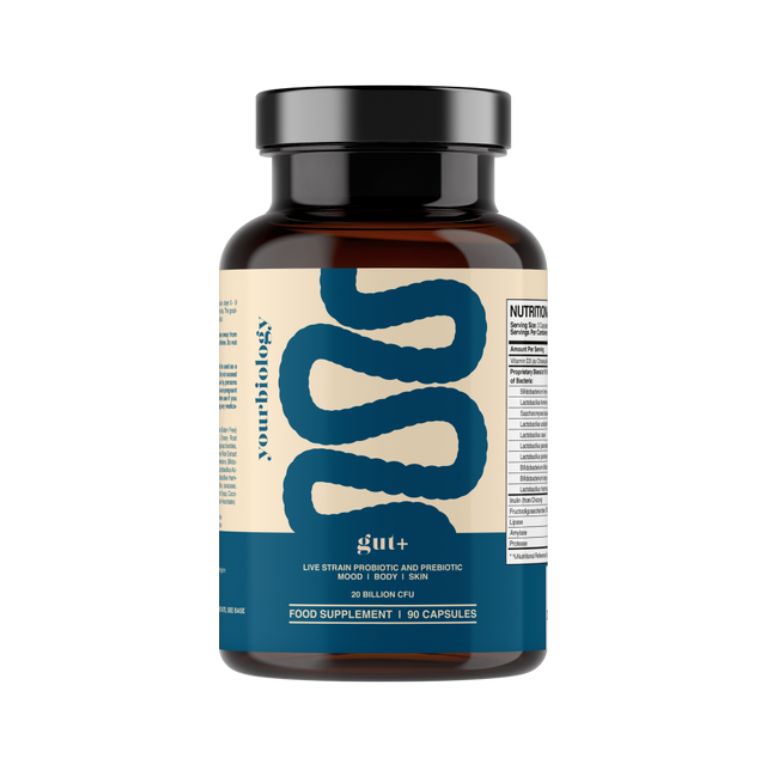
|
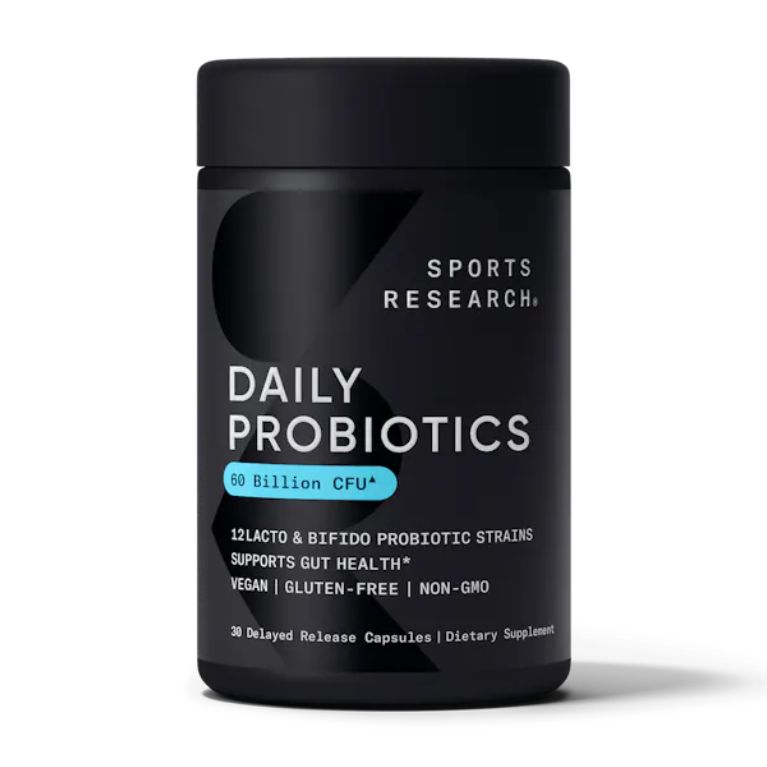
|
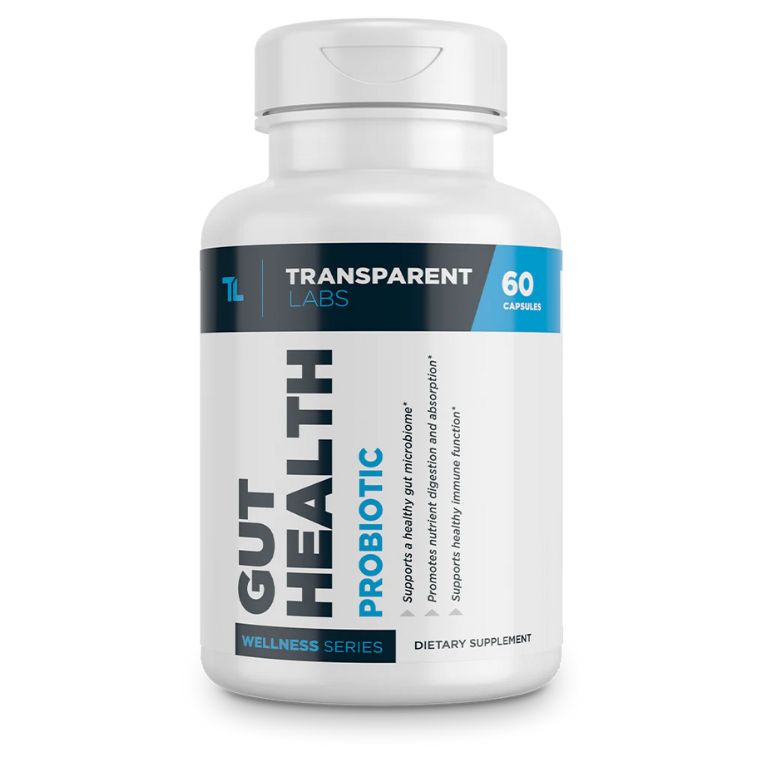
|
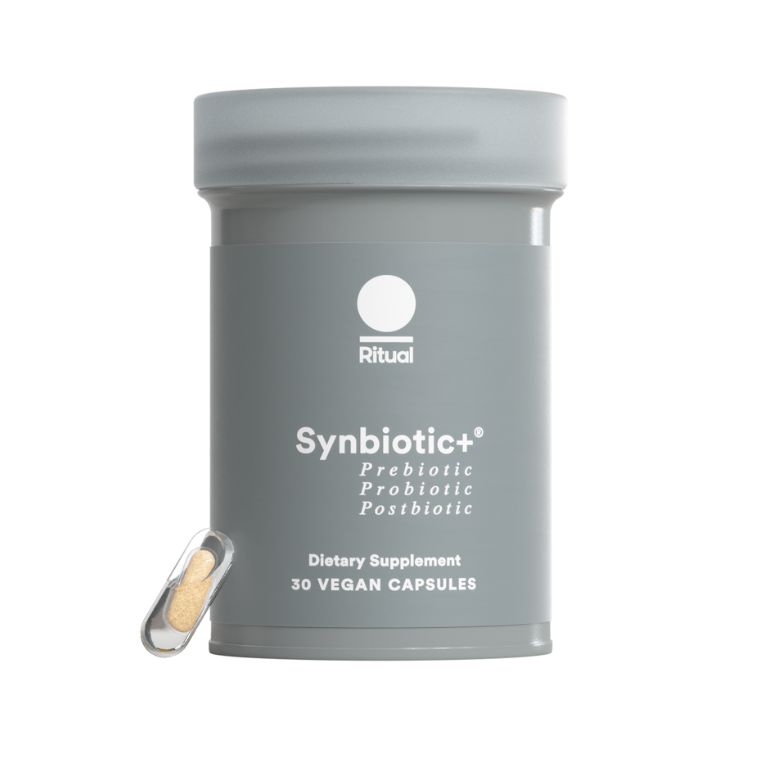
|
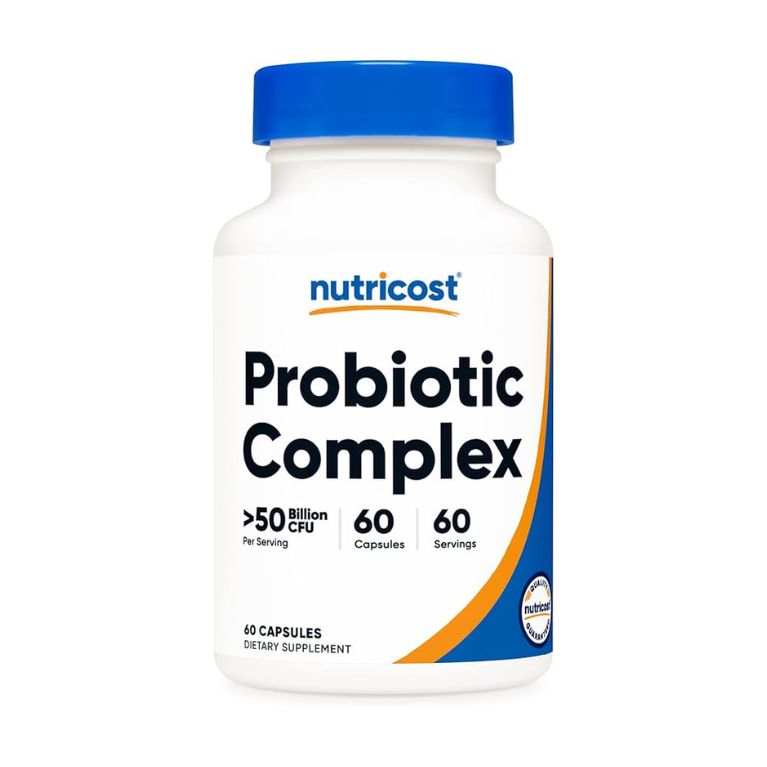
|
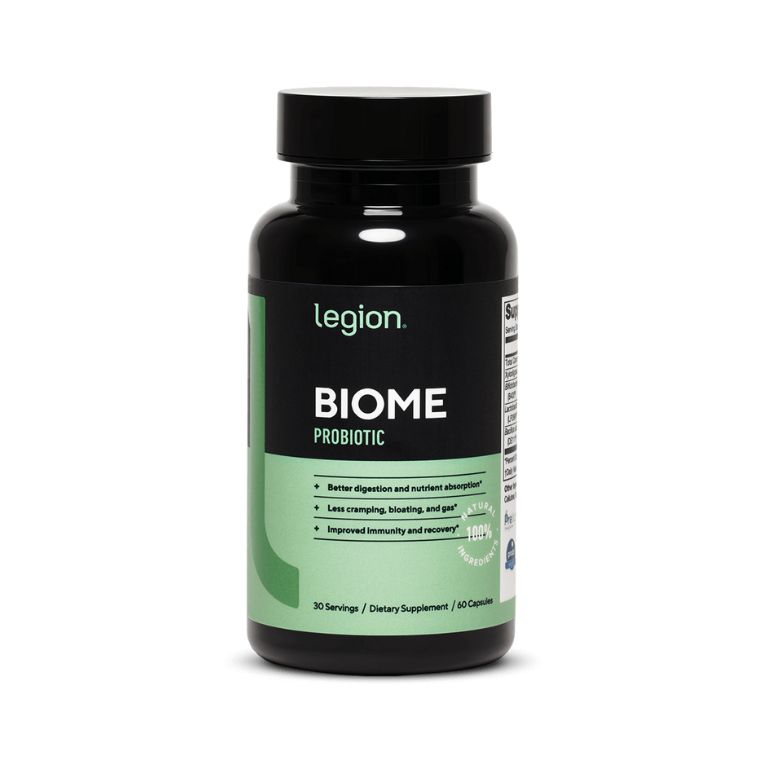
|
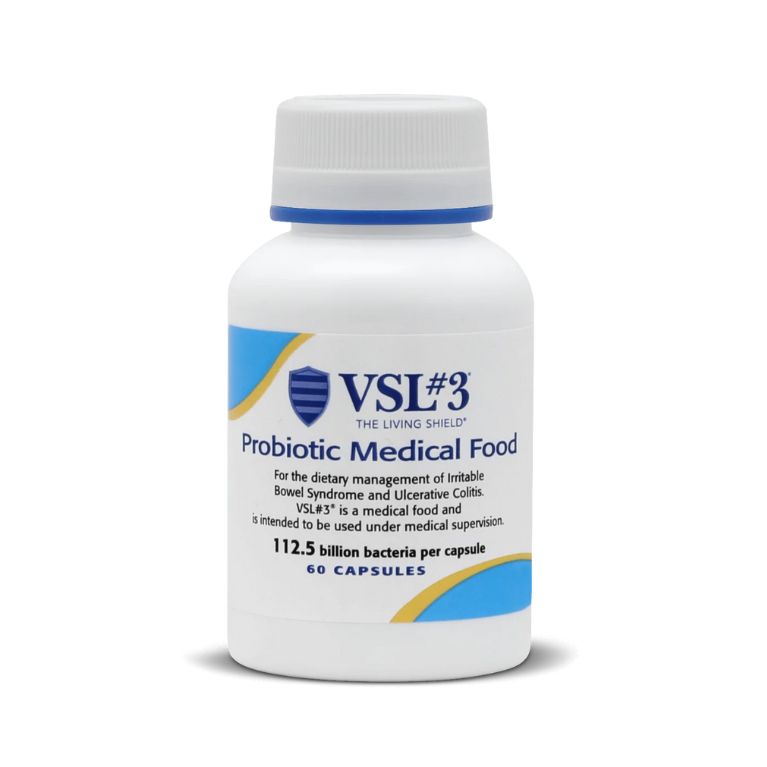
|
|
| Yourbiology | Sports Research Daily Probiotics | Transparent Labs Gut Health | Ritual Synbiotic+ | Nutricost Probiotic Complex | Legion Biome | VSL#3 Capsules | |
| Rating | |||||||
| Cost per serving | $1.30-$2.17 | $0.83 | $1.53 | $1.80 | $0.33 | $1.67 | $2.20 |
| CFUs | 20 billion | 60 billion | 100 billion | 11 billion | 50 billion | 25 billion | 112.5 billion |
| Number of probiotic strains | 10 | 12 | 10 | 2 | 10 | 3 | 8 |
How we score the best probiotics
Our team has tested 20 probiotics and researched dozens more. Every probiotic we review is rated across six primary categories. Each category is assigned a different percentage weight of the total score based on its relative importance when considering whether or not you should purchase a plant-protein product. Probiotic supplements can also earn bonus credits that boost the overall rating for third-party testing credentials from NSF, Labdoor, and more.
You can check out our complete probiotic testing methodology here.
Exclusion of proprietary blends—25%
There are many different probiotic strains, each designed to address a specific health goal. Avoiding proprietary blends is crucial for transparency, allowing consumers to know exactly what and how much of each ingredient is included, ensuring a better assessment of the product’s effectiveness and safety.
Cultures contained—25%
Identifies the specific strains of probiotics or beneficial bacteria present in the product. The importance lies in the fact that different strains offer distinct health benefits, such as improved gut health, enhanced immunity, or better digestion.
Here are a few we consider:
- Lactobacillus rhamnosus
- Lactobacillus plantarum
- Bifidobacterium lactis
- Bifidobacterium longum
- Saccharomyces boulardii
- Streptococcus thermophilus
Whether they’re encapsulated with a food source—20%
We determine if the probiotic cultures are paired with a prebiotic or other food source that nourishes the bacteria during digestion. This can enhance the survival rate of probiotics as they navigate through the digestive system, ensuring they reach the intestines effectively.
Whether cultures are alive—15%
This examines whether the probiotic cultures in the product are alive and viable at the time of consumption, which are necessary for the probiotics to exert their beneficial effects in the gut. The effectiveness of the product often depends on the survival of these cultures through processing and storage.
Colony forming units (CFUs) at end of shelf life—10%
CFUs represent the number of live microorganisms, typically bacteria, present in a probiotic supplement at the end of its shelf life. We like to see probiotics that provide at least 20 billion or more CFUs, though these are the ranges we consider:
- Under 1 billion
- 1 Billion to 4.9 Billion
- 5 Billion to 9.9 Billion
- 10 Billion to 19.9 Billion
- 20 Billion+
Form—5%
The form is important because it can affect how easily the product is consumed, absorbed, and stored. Different forms may also have varying shelf lives and convenience factors for the user.
We evaluate:
- Capsules
- Tablets
- Powders
- Liquids
FAQs
Is it worth taking gut health supplements?
Although certain bacterial strains may have specific health benefits, every individual’s microbiome is unique. (18) You may respond differently to gut health supplements than someone else—so only you can tell whether using them benefits you. Still, research shows that supplementing with gut-friendly bacteria might improve bowel health, influence immune response, and help the gut bounce back after a course of antibiotics. (15) If you have a particular health problem you want to address, talk to your doctor about which probiotic might be right for you.
Can you take Yourbiology Gut+ if you have dietary restrictions?
Since Yourbiology Gut+ is free of gluten, soy, and dairy and has a vegan-friendly formula, it’s suitable for most dietary restrictions. The only ingredient besides probiotics, digestive enzymes, and prebiotic fiber is hydroxypropyl methylcellulose, a substance used to create the capsules’ shell.
Is Yourbiology Gut+ worth the price?
Undoubtedly, Yourbiology Gut+ is one of the costliest probiotics on the market. Compared to alternatives like Nutricost Probiotic Complex, which clocks in at under $0.40 per serving, its $1.30-$2.17 per serving price is certainly steep. That said, since Yourbiology contains probiotic strains aimed at improving numerous health issues (not to mention digestive enzymes, fiber, and vitamin D), it may be worth its higher-than-average price tag.
These statements have not been evaluated by the Food and Drug Administration. These products are not intended to diagnose, treat, cure, or prevent any diseases.
Our experts
Victoria Burgess, Ph.D., CSCS, CISSN
Victoria Burgess earned her Ph.D. in Health and Human Performance from Concordia University Chicago and holds her NSCA CSCS and Certified Sports Nutritionist (CISSN). She is an adjunct professor in the Human Performance and Nutrition department at Concordia University Chicago & Parker University, where she teaches undergraduate, graduate, and doctoral-level courses.
Joana Neziri, M.S., NASM CPT
Joana is a writer, editor, and content strategist focusing on nutrition, fitness, and all things health. After earning a master’s degree in business from the University of North Florida, she began a career in research and digital marketing.
Jessica Coulon
Jessica is a contributing editor and writer who specializes in fitness, health, nutrition, and science content. Previously, she was an editor for Popular Mechanics and Bicycling, where she covered pro cycling news, wrote how-to guides, and tested all the latest and greatest bike gear. She was also a regular shoe tester and contributor for Runner’s World. You can often find her skiing or riding her mountain bike, and racing with the F1RE female enduro team.
Kelly Uhler
Kelly has a multifaceted background in elder care, health care, and copywriting. She has worked for organizations such as A Place For Mom and Homecare.com, which gave her the opportunity to work closely with families, providing reliable information to help them make informed decisions about their loved one’s health, safety, and quality of life.

Sarah Garone, NDTR, CNC
Fortune Recommends Nutrition Writer
About Author
Sources
- Farré-Maduell E, Casals-Pascual P. The origins of gut microbiome research in Europe: From Escherich to Nissle, Human Microbiome Journal, 2019(14). https://doi.org/10.1016/j.humic.2019.100065.
- National Library of Medicine. Study of the Human Microbiome. Accessed October 21, 2024.
- SX, Huang SY, Saimaiti A, Yang ZJ, Gan RY, Li HB. The Role of Gut Microbiota in Anxiety, Depression, and Other Mental Disorders as Well as the Protective Effects of Dietary Components. Nutrients. 2023 Jul 23;15(14):3258. doi: 10.3390/nu15143258.
- Durack J, Lynch SV. The gut microbiome: Relationships with disease and opportunities for therapy. J Exp Med. 2019 Jan 7;216(1):20-40. doi: 10.1084/jem.20180448.
- Parker EA, Roy T, D’Adamo CR, Wieland LS. Probiotics and gastrointestinal conditions: An overview of evidence from the Cochrane Collaboration. Nutrition. 2018 Jan;45:125-134.e11. doi: 10.1016/j.nut.2017.06.024.
- McCrea GL, Miaskowski C, Stotts NA, Macera L, Paul SM, Varma MG. Gender differences in self-reported constipation characteristics, symptoms, and bowel and dietary habits among patients attending a specialty clinic for constipation. Gend Med. 2009 Apr;6(1):259-71. doi: 10.1016/j.genm.2009.04.007.
- Minami J, Iwabuchi N, Tanaka M, Yamauchi K, Xiao JZ, Abe F, Sakane N. Effects of Bifidobacterium breve B-3 on body fat reductions in pre-obese adults: a randomized, double-blind, placebo-controlled trial. Biosci Microbiota Food Health. 2018;37(3):67-75. doi: 10.12938/bmfh.18-001.
- Cleveland Clinic. Acidophilus. Accessed October 21, 2024.
- Alipour, B., Homayouni-Rad, A., Vaghef-Mehrabany, E., Sharif, S.K., Vaghef-Mehrabany, L., Asghari-Jafarabadi, M., Nakhjavani, M.R. and Mohtadi-Nia, J. (2014), Effects of Lactobacillus casei supplementation on disease activity and inflammatory cytokines in rheumatoid arthritis patients: a randomized double-blind clinical trial. Int J Rheum Dis, 17: 519-527. https://doi.org/10.1111/1756-185X.12333
- Moroi M, Uchi S, Nakamura K, Sato S, Shimizu N, Fujii M, Kumagai T, Saito M, Uchiyama K, Watanabe T, Yamaguchi H, Yamamoto T, Takeuchi S, Furue M. Beneficial effect of a diet containing heat-killed Lactobacillus paracasei K71 on adult type atopic dermatitis. J Dermatol. 2011 Feb;38(2):131-9. doi: 10.1111/j.1346-8138.2010.00939.x.
- Cleveland Clinic. How to Pick the Best Probiotic. Accessed October 21, 2024.
-
Is the probiotic “Milk Test,” as described on many websites, really an effective way to test the quality of the bacteria in probiotic supplements at home? ConsumerLabs. Accessed October 22, 2024.
- Qin YQ, Wang LY, Yang XY, Xu YJ, Fan G, Fan YG, Ren JN, An Q, Li X. Inulin: properties and health benefits. Food Funct. 2023 Apr 3;14(7):2948-2968. doi: 10.1039/d2fo01096h.
- Johns Hopkins University. Digestive Enzymes and Digestive Enzyme Supplements. Accessed October 22, 2024.
- Khadilkar SS. The Emerging Role of Vitamin D3 in Women’s Health. J Obstet Gynaecol India. 2013 Jun;63(3):147-50. doi: 10.1007/s13224-013-0420-4.
- Cleveland Clinic. Probiotics. Accessed October 22, 2024.
- National Center for Complementary and Integrative Health. Probiotics: Usefulness and Safety. Accessed October 21, 2024.
- Pullar JM, Carr AC, Vissers MCM. The Roles of Vitamin C in Skin Health. Nutrients. 2017 Aug 12;9(8):866. doi: 10.3390/nu9080866.
- Kalafati M, Jamurtas AZ, Nikolaidis MG, Paschalis V, Theodorou AA, Sakellariou GK, Koutedakis Y, Kouretas D. Ergogenic and antioxidant effects of spirulina supplementation in humans. Med Sci Sports Exerc. 2010 Jan;42(1):142-51. doi: 10.1249/MSS.0b013e3181ac7a45.
- Wagenlehner F, Lorenz H, Ewald O, Gerke P. Why d-Mannose May Be as Efficient as Antibiotics in the Treatment of Acute Uncomplicated Lower Urinary Tract Infections-Preliminary Considerations and Conclusions from a Non-Interventional Study. Antibiotics (Basel). 2022 Feb 25;11(3):314. doi: 10.3390/antibiotics11030314.
